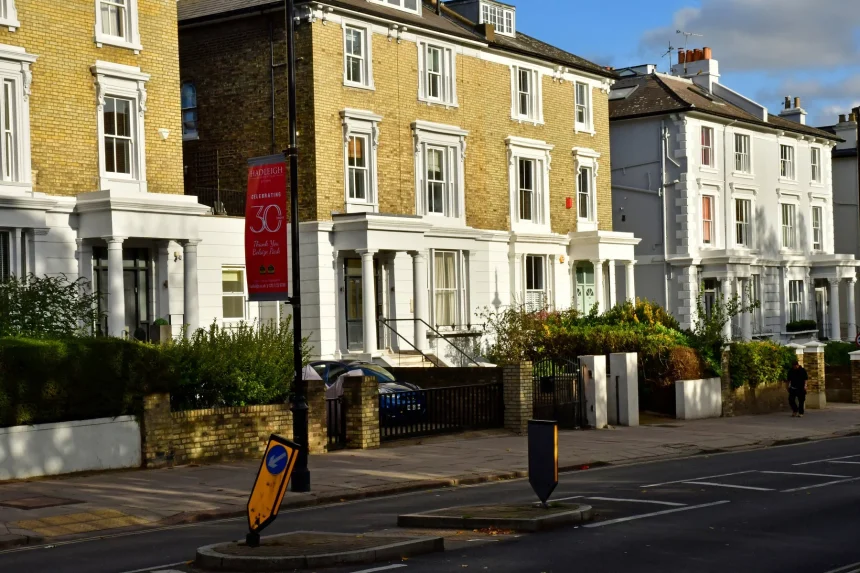Renting an apartment in the UK can be daunting for international students. This article aims to provide you with valuable insight into how to complete the process successfully. Finding the right flat, understanding the rental adverts, signing the contract and moving into the room, we will cover all the key aspects that need your attention. By the end of this article, you will have a comprehensive understanding of renting in the UK. You will be able to secure a comfortable and satisfactory room that will fully enrich your study abroad experience.
Generally speaking, rooms suitable for students can be divided into two categories: student accommodation ( divided into on-campus dormitories and off-campus flats) and private housing. At the end of the article, there is also information about the rights and obligations of private house renting in the UK.

On-Campus Dormitory Renting In The UK
On-campus dormitory refers to the accommodation facilities that are directly managed by each university/college, which can be understood as the official accommodation options of the university. On-Campus Dormitory can be categorised into Halls, Flats and Houses. These accommodation units are generally clustered in different areas but scattered around the university’s various colleges. Small halls usually do not have public facilities; medium-sized halls of residence will contain spaces such as laundry, car parks, meeting rooms, etc.; large halls will add restaurants, shops, social centres, sports centres and other public places. Students can get detailed information from within the official website of the university.
Catering
When talking about On-campus dormitory, we can also categorise it into catered and self-catering. Catered halls of residence usually provide breakfast and dinner, and some include three meals a day, but dinner is not usually offered on holidays. Self-catering flats generally have ovens, cookers, refrigerators, microwaves, etc., so students can cook their meals.

Room Type
In terms of bathrooms, most rooms are en-suite and non-en-suite, with the difference being that en-suite rooms have their own bathrooms. Otherwise, they have to be shared with a roommate. A few universities also offer Studio rooms, which also have private bathrooms. Rooms are furnished with a single bed, desk, wardrobe, etc. Newer dormitories may have internet access and an aerial TV socket.
Contract Length
University dormitories in the UK typically divide their time by semester, with different regulations for each semester and the three holidays – Christmas, Easter, and summer. Some dormitories let you stay in one place throughout the entire year, while others require students to move to a different dormitory during the holidays, with the vacant dormitories being available for others. Therefore, it’s advisable to familiarize yourself with the rules and regulations of a hostel when applying.
Cancel/ Change Flat
When you first book the flat you will sign a contract to secure your room and pay a deposit of around £250. When you move in, you’ll need to sign another contract to ensure that you won’t move out during the contract period, and that you’ll have to pay for the costs if you try to move out in the middle of the process.
Therefore, after moving into an on-campus flat, it is very difficult to change or get out of the room. The only way out is to find a new place quickly within a week of moving in and insist on not signing a second contract. However, it is important to note that some universities only give a two or three day deadline, and once you decide to move out of the halls of residence, the deposit you paid for the first contract will be forfeited.

Tips
Generally speaking, if you receive a conditional offer, you will need to arrive earlier for your language course. If you are not satisfied with your room, you will have time to adjust your choice of accommodation before the start of the academic year.
Most students with unconditional offers arrive in the UK just before the start of the academic year, as this is when on-campus accommodation is usually available. So these students only have a little time to experience the living environment and will need to find out as much information as possible when booking a room in the first place.
Also, most on-campus student accommodation in the UK is very tight, so it is only available to first-year undergraduate/master students. For other students, universities will encourage applicants to look for accommodation off-campus.
Off-Campus Student Accommodation Renting In The UK
In addition to university-run student accommodation, a type of student accommodation is provided by third-party flat providers outside the university. For students, this type of flat has the advantage of a wide choice and offers various additional services. All can find the most suitable student rooms according to their needs and preferences.
Room Types
Most third-party flats have the same types of rooms as on-campus dormitories but are generally more tastefully decorated and offer a broader range of appliances and amenities.
The En-suite room in the UK is the most common type of room within off-campus student accommodation, which offers a good balance of privacy and socialisation. The bedrooms are equipped with private bathrooms to ensure privacy and hygiene for the students. The shared kitchen and living room areas provide space to socialise with roommates. Most En-suite rooms are for 2 to 8 people living in a suite.
Unlike the En-suite, the Studio rooms offer entirely separate living spaces. Not only does the room have a private bathroom, but the kitchen, bedroom, and study are all grouped so that students can allocate as much space as they like, making it perfect for students who prefer to live alone. Some Studio flats also support double occupancy, which may require an additional fee.
The only difference between a Non-En-suite room and an En-suite is the need to share a bathroom with a roommate, which can sometimes lead to inconvenience. However, more and more flats are installing extra sinks in the bedrooms to help students wash up.
The One-Bedroom apartment is arguably the most luxurious student accommodation option available, with the interior including a separate bedroom, bathroom, kitchen and living room. The spacious area allows students to enjoy the feeling of living at home.
Amenities & Services
Off-campus student apartment generally pay more attention to service quality, reputation and safety. They have a front desk and are fully equipped. Most of the flats have their own laundry, gym, activity room, etc., as well as a wider coverage of security surveillance and access control system. A few even have basketball courts and swimming pools provided. When students encounter any problems, the maintenance team will be the first to send an officer to their home.

Student Accommodation Renting Platform In The UK
Students who want to know more about student accommodation can visit uhomes.com, an online booking platform for student accommodation.

uhomes.com has successfully helped more than 100,000 international students find their ideal study accommodation. Its services cover over 20 countries and 500 cities, including the UK, the US, Canada, Australia and New Zealand. On the uhomes website, you can set the rental period, length of stay, room type, distance to school, price range, etc., according to your personal needs, making it very convenient to compare different room types when booking.
“I used uhomes.com in my first year of renting a room in the UK, and the consultants are very responsible. They answered the phone in the evening and helped me answer many questions about my study life.”
Private House Renting In The UK
Information Source
Finding private rented accommodation requires patience and a bit of luck to find satisfactory and inexpensive accommodation. Information can usually be obtained from the university’s Accommodation Office, Letting Agencies/ Estate Agents, Student Union notice boards, or personal information sources.

Letting Agencies/ Estate Agents
Personally, I think Estate Agents is a recommended option to save you a lot of hassle in the house-hunting process. You need to find an agent near the university and follow the information to choose the house you are interested in, and the agent will help you to make an appointment with the landlord to see the house. Of course, agents will charge a referral fee or commission, usually for a few weeks’ rent.
Contract Of Private House Renting In The UK
A Tenancy Agreement is essential when renting privately and provides legal protection for the landlord and the tenant. Generally, landlords who are members of the Landlord Association will offer a standardised formal contract that can be signed by both parties, including the address of the property being shown, the contract term, the rent, and the signatures of both parties. A rental contract drawn up by the landlord himself or through a solicitor is also legally binding, provided that it is established relatively and equitably and written in English.
Another type of contract that requires special attention is the Joint Tenancy Agreement, where the landlord requires the tenant to rent all the rooms in the house at once, not one by one. Once the tenant has signed such a contract, they must pay the whole house monthly rent. It is recommended that you find a flatmate before signing the contract, as you will have to pay the total amount of rent if you don’t have a flatmate after signing the contract.
UK law states that the tenancy contract must be six months or more; as long as the tenant pays the rent on time, the landlord cannot evict the tenant within six months, and the tenant cannot break the contract within six months. Upon expiry, both sides can negotiate a new contract, which becomes a rolling contract, i.e. both sides can terminate the contract by giving 1-2 months’ notice to the other side.
Council Tax Of Renting In The UK
The first thing you need to consider after moving in is Council Tax, which is levied by the local Council on the property’s market value, usually around £600-2000 per year. However, full-time students are exempt from paying this tax during their time at school. All they need to do is go to the school office and ask for a Council Tax Certificate, send a copy to the City Council, or apply online to the official website to be exempted. The Council sends out annual letters reminding tenants to pay their Council Tax, so students who have lived in a house for more than a year should remember to apply every year.

Bills
The various bills after you move in also require special attention. Most houses in the UK do not have water meters; instead, pay a fixed fee twice a year and then use it as much as you like. In Scotland, water charges are included in the house tax, so students can enjoy an exemption from paying water charges. Electricity and gas are usually produced by reading the meter and spending according to the bill sent in each month.
If the house is metered for students new to the property, it’s a good idea to ask the landlord to read the numbers on the meter on the day you move in to make sure you know where you’re starting from. If you are the first tenant to move in, you may also need to notify the provider to avoid being billed for past tenants. It is advisable to read the form every time a new or old tenant moves in or out to avoid disputes in the future.
Tips
- Look out for unreasonable clauses in the contract.
- Any agreement with the landlord should be written into the contract.
- The contract should state who will maintain the facilities in the house.
- The deposit is usually one month’s rent and, by law, cannot exceed two months.
- Remember to ask your landlord for a receipt for the deposit as proof of refund. If the property is too dirty or badly damaged when you return it, the deposit will be deducted.
- The length of the tenancy can be discussed with the landlord (usually six months for Aagents’ properties). The usual minimum is six months, and the maximum is unlimited.
Rights And Obligations Of Private Renting In The UK
Your rights
- Unless it is an emergency, the landlord should give the tenant 24 hours’ notice before they arrive, and this rule also applies to anyone they appoint. However, in the case of a joint contract, if the landlord gives notice to one of the tenants, it is assumed that all the tenants have been notified.
- Landlords should only do ordinary repairs during the tenancy if the tenant agrees.
- The landlord should not interfere with the tenant’s lifestyle as long as the tenant is not violating the lease.
- If the landlord enters the house without prior notice or carries out unnecessary repairs, the tenant has the right to make them stop. If the tenant feels threatened by the landlord’s (or landlord’s representative’s) behaviour, the tenant can call the police.

Your obligations
- Tenants are expected to look after the house as if it were their property, but this area is often disputed.
- The tenant should pay for any damage to the room or house caused by the tenant’s negligence.
Common Abbreviations Used From Renting Adverts In The UK
| Abridge | Meaning |
|---|---|
| all mod cons | All modern conveniences |
| CT | council tax |
| DB room | double bedroom |
| Dep/refs reqd | Deposit and references required |
| DG | double glazing |
| GCH | gas central heating |
| Nr stn | Near station |
| N/S | non smoking |
| W/M | Washing machine |
| f/f | fully furnished |
This article details the options and difficulties that international students may encounter when renting an apartment in the UK, and I hope it helps. It is also important to note that the rental market varies from region to region and city to city in the UK. Hence, students need to check the information in advance, depending on the location of their university. If you have any thoughts or questions, please leave them in the comments section below.
FAQ
It is in fact possible for international students to rent accommodation in the UK. This is a common practice and a rite of passage for many international students studying away from home. The UK is a diverse and inclusive society that opens its arms to all, providing a great environment for cultural exchange and learning. The process of renting an apartment can be daunting at first, but rest assured that there are many resources and organisations available to guide you.
Paying for student accommodation is very simple in the UK. Payments are usually made in three instalments based on the semester. This payment is timed to coincide with the disbursement of student loans, which many students rely on to pay for their accommodation. Some accommodation providers also offer the option of a one-off annual payment. It’s important to remember that your rent agreement will specify how payments are to be made, the due date and any penalties for late payment.
Yes, international students can indeed buy property in the UK. There are no specific legal restrictions prohibiting international students or non-residents from owning property in the UK. However, the process of buying a property can be complicated. Be aware that there are additional costs associated with purchasing a property, such as stamp duty, solicitor’s fees and possibly survey costs. Additionally, obtaining a mortgage as an international student can be challenging as lender criteria often require a large deposit and proof of a steady income.
- London: As the capital of England and the largest city in the UK, London’s bustling streets offer a colourful life for everyone. Whether you are a history buff or a student of art, the various landmarks here will capture your attention. And London’s food culture shouldn’t be underestimated. London offers multiple food and dining experiences, from street food markets to Michelin-starred restaurants.
- Edinburgh: Edinburgh is the capital of Scotland, United Kingdom, and is located on the southern shore of the Firth of Forth in the central lowlands of Scotland. Edinburgh is also home to one of the oldest universities in the UK, the University of Edinburgh, which remains one of the world’s leading universities.
- Manchester: As one of the most famous cities in the UK, Manchester is home to several universities. Naturally, the student accommodation market here attracts people year after year, and the University of Manchester is a world-renowned university.
- Belfast: Located on the northeast coast of the island of Ireland, Belfast is the largest seaport in the Northern Ireland region of the United Kingdom and the capital of Northern Ireland.
- Durham: Durham is a historical city in the North East of England, renowned for its beautiful architecture, rich cultural heritage and world-class universities. With its excellent academic institutions and vibrant student life, Durham is popular with students worldwide.
- Nottingham: Nottingham is one of the oldest cities in the UK, with many legendary stories. Nottingham is also known as a university town, with institutions of higher learning such as the University of Nottingham and Nottingham Trent University adding to the city’s cultural flavour.
The cost of student accommodation in the UK can vary greatly depending on the location and type of accommodation. On average, students spend between £400 and £1,200 per month. However, in cities such as London and Manchester, costs can be higher, up to £1,500 per month.








